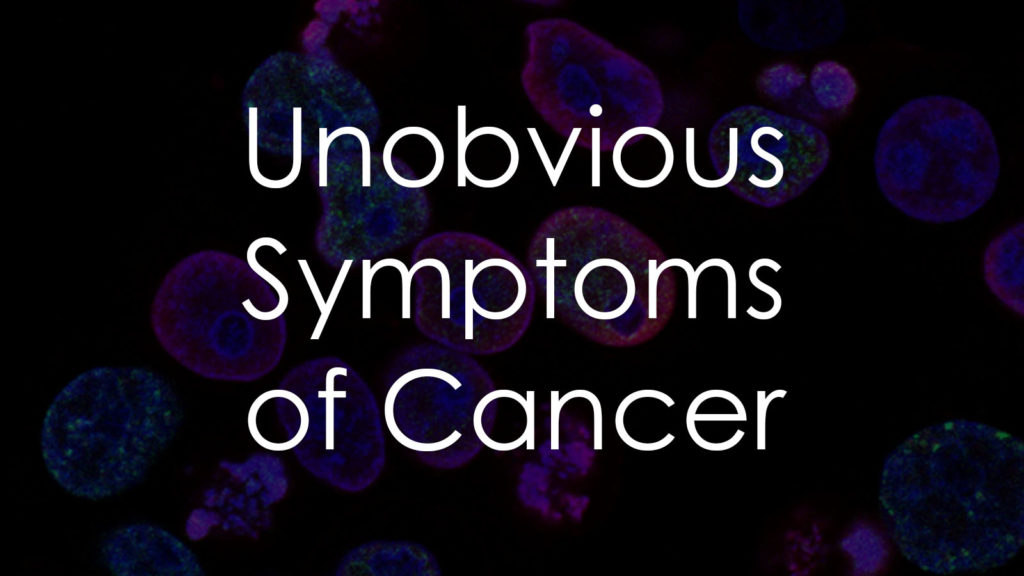Cancer is a formidable disease, often shrouded in fear and misunderstanding. While some symptoms are well-known and readily identifiable, such as lumps in the breast or unusual bleeding, many symptoms are more subtle and easily overlooked. Recognizing these unobvious symptoms can be crucial for early detection and treatment, potentially saving lives. This article delves into some of the less obvious symptoms of cancer, helping to increase awareness and encourage proactive health management.

1. Persistent Fatigue
While fatigue is a common complaint, especially in today’s fast-paced world, persistent and unexplained fatigue can be a symptom of various cancers, including leukemia, colon cancer, and stomach cancer. Unlike the usual tiredness, this fatigue doesn’t go away with rest and can be debilitating. It is often accompanied by other symptoms like unexplained weight loss or changes in appetite, making it important to pay attention to persistent exhaustion that disrupts daily life.
2. Unexplained Weight Loss
Losing weight without trying might seem like a blessing to some, but it can be an early warning sign of cancers such as pancreatic, stomach, esophageal, or lung cancer. This weight loss is typically significant—over 10 pounds—and occurs without changes in diet or exercise. The body’s increased metabolic demands due to the growth of cancerous cells often cause this unexpected weight loss.
3. Changes in Skin
Skin changes are not limited to the appearance of moles or lesions. Other subtle signs include jaundice (yellowing of the skin and eyes), darkening of the skin, increased hair growth, and reddened skin. These changes can indicate liver cancer, ovarian cancer, or even cancers of the blood. Any persistent skin change that doesn’t resolve on its own should be evaluated by a healthcare professional.
4. Chronic Cough or Hoarseness
A chronic cough or persistent hoarseness can be indicative of lung cancer, especially if accompanied by other symptoms like chest pain, shortness of breath, or coughing up blood. Similarly, hoarseness lasting more than a few weeks could point to cancers of the larynx (voice box) or thyroid. Since these symptoms can easily be mistaken for less serious conditions like allergies or a cold, they often go uninvestigated until the cancer is more advanced.
5. Persistent Pain
Pain is a common symptom of many conditions, but persistent, unexplained pain can be a warning sign of cancer. Bone pain, particularly in the spine, can be a sign of bone cancer or cancer that has metastasized to the bones. Headaches that do not respond to usual treatments could indicate a brain tumor. Abdominal pain might point to ovarian, pancreatic, or stomach cancer. When pain is persistent and doesn’t have a clear cause, it warrants further medical investigation.
6. Changes in Bowel or Bladder Habits
Sudden changes in bowel or bladder habits, such as constipation, diarrhea, blood in the stool, or changes in the size and shape of stool, can be early signs of colon or rectal cancer. Similarly, changes in urination, including blood in the urine, increased frequency, or pain during urination, can indicate bladder or prostate cancer. These symptoms are often mistaken for less serious conditions like infections or hemorrhoids, delaying diagnosis.
7. Difficulty Swallowing
Difficulty swallowing (dysphagia) can be a symptom of esophageal or throat cancer. This might start as a minor irritation but can progress to the point where swallowing solid foods becomes challenging. Sometimes, this symptom is accompanied by unintentional weight loss and a sensation of food being stuck in the throat or chest.
8. Unusual Bleeding or Discharge
Unexpected bleeding or discharge can occur in various cancers. For instance, blood in the stool might indicate colon or rectal cancer, while blood in the urine could suggest bladder or kidney cancer. Postmenopausal bleeding or unusual vaginal discharge can be a sign of endometrial or cervical cancer. Bleeding from the nipple can indicate breast cancer. Any unexplained bleeding should prompt a visit to the doctor.
9. Sores That Do Not Heal
Sores that do not heal, particularly in the mouth or on the skin, can be a sign of cancer. Oral cancers can present as persistent sores in the mouth or on the lips. Skin cancers might manifest as sores or ulcers that do not heal. Any sore that persists for more than a few weeks should be examined by a healthcare professional.
10. Lymph Node Changes
Swollen or enlarged lymph nodes, especially in the neck, armpit, or groin, can be an early sign of cancers such as lymphoma, leukemia, or cancers that have spread from another part of the body. Lymph nodes can swell due to infections, but when the swelling is persistent and not associated with an infection, it’s a good idea to get it checked out.
Conclusion
Cancer can present itself in myriad ways, many of which are subtle and easily overlooked. Persistent fatigue, unexplained weight loss, changes in skin, chronic cough, persistent pain, changes in bowel or bladder habits, difficulty swallowing, unusual bleeding or discharge, sores that do not heal, and lymph node changes are all symptoms that can be associated with cancer. Awareness of these unobvious symptoms is crucial for early detection and treatment. If you or someone you know is experiencing any of these symptoms, it’s important to consult a healthcare professional for further evaluation. Early diagnosis often leads to better outcomes, emphasizing the importance of vigilance and proactive health management.